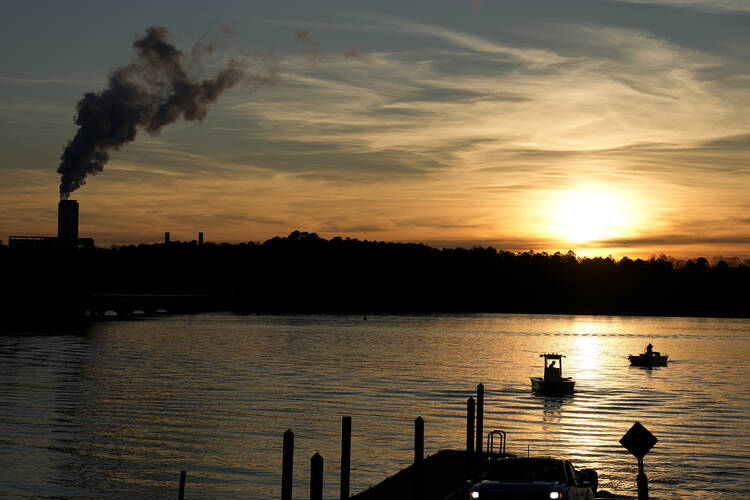When I first started working at America in July 2015, I dove into our website analytics as part of my work on digital strategy. An article headlined “Top Ten Takeaways from ‘Laudato Si’’” was consistently near the top of the results.
Pope Francis had issued “Laudato Si’,” his encyclical on “care for our common home,” on June 18, 2015, and people were definitely paying attention.
One of the novelties of the encyclical was its title, preserving its opening quote from St. Francis’ “Canticle of the Creatures” in medieval Italian, rather than the usual few words from the beginning of the official Latin text. “Laudato Si’, mi’ Signore”: “Praise be to you, my Lord, through our Sister, Mother Earth,” St. Francis writes in the canticle.
(Nine years later, I still have to squint to make sure the punctuation at the end of the encyclical’s title adds up correctly. Say a prayer for all the proofreaders who have to check apostrophes inside single quotes inside double quotes.)
Of course, more than for its title, people were paying attention because Pope Francis was making climate change a central issue in the church’s social teaching. The encyclical captured the world’s attention during the preparations for 2015’s Paris Agreement, which aimed to hold global warming to a limit of 2 degrees Celsius above pre-industrial averages.
Are we still paying attention?
Perhaps more than ever we are aware of the threat of climate change. Alongside the other catastrophes in the headlines, “extreme weather” has become a distressingly common phenomenon, to the point where the idea of the “hundred-year storm” is not just a misnomer but a marker of how the climate is changing much more quickly than our behavior or policies are. For the first time, our global average temperature over a year has exceeded 1.5 degrees of warming.
But are we still paying attention to “Laudato Si’,” or to Pope Francis’ most recent intervention on the environment, his apostolic exhortation “Laudate Deum,” issued in October 2023? In that update, eight years after “Laudato Si’,” Francis warned starkly that “our responses have not been adequate, while the world in which we live is collapsing and may be nearing the breaking point.”
This question was taken up at a recent conference of bishops, theologians, environmental leaders and journalists, held in San Diego, that I attended. The third iteration of “The Way Forward” conference, sponsored by a consortium of Catholic universities, focused on the reception of Pope Francis’ teaching on the environment by the church in the United States.
Especially given that “Laduate Deum” had closed by pointing out that American greenhouse gas emissions, measured per capita, are double China’s and seven times the average of the poorest countries, the question was stark. Certainly, no one showed up at the conference saying that the church in the United States has received “Laudato Si’” as well as we need to.
I wish I could say that the conference identified a clear solution. Instead, our discussions recognized that the challenge of ecological conversion—a phrase St. John Paul II used as far back as 2001—was interwoven with many other ecclesial challenges as well.
At the conference, we heard Catholics from Latin America tell us that in the Amazon region, “Laudato Si’” has sparked a restructuring of the way dioceses and national churches cooperate together in order to address issues that are not defined by borders. We heard that at the continental phase of synodal meetings in Oceania, climate change was a main issue, because for those living on islands, sea level rise is a present, existential question. And we were reminded frequently that young people see inaction on climate change as a mark of hypocrisy and a source of despair, an environmental and spiritual crisis simultaneously.
Are we paying attention?
In this issue, as we mark the 115th anniversary of America, we are reprinting (as the “Last Take”) an essay from Dorothy Day, first published 90 years ago, written as a letter to an agnostic who had objected that Christianity’s attention to conversion from sin and wrestling with “the shadow of death” was morbid. She responded that if our souls are not in a healthy state, then “of course we feel morbid,” and that prayer was precisely the exercise needed for our healing.
I returned from the conference convinced that a prayerful re-engagement with “Laudato Si’,” including an honest appraisal of our own resistance to it, is a spiritual exercise the church in the United States needs. Part of our inability—or refusal—to respond to climate change is the temptation to despair of the inadequacy of anything we can do individually or even nationally in the face of a global crisis. The answer to despair is not just better action and policy, but deeper hope: a recognition that we have been called by God to solidarity with one another and with all of creation. That is a call for the church both to hear and to proclaim.








